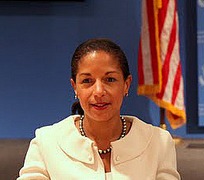Yesterday, the Natural Resources Defense Council’s OnEarth magazine dropped a bombshell. United States Ambassador to the United Nations Susan Rice, widely rumored to be the leading contender to replace Hillary Clinton as secretary of state, has large investments in both TransCanada, the company seeking to build the Keystone XL pipeline, and other businesses with a stake in seeing it built. The secretary of state, you may remember, is responsible for granting any permit to build the border-crossing pipeline.
In addition to TransCanada stock valued between $300,000 and $600,000, OnEarth outlines the breadth of her investments.
[A]ccording to financial disclosure reports, about a third of Rice’s personal net worth is tied up in oil producers, pipeline operators, and related energy industries north of the 49th parallel — including companies with poor environmental and safety records on both U.S. and Canadian soil. Rice and her husband own at least $1.25 million worth of stock in four of Canada’s eight leading oil producers, as ranked by Forbes magazine. That includes Enbridge, which spilled more than a million gallons of toxic bitumen into Michigan’s Kalamazoo River in 2010 — the largest inland oil spill in U.S. history.
Rice also has smaller stakes in several other big Canadian energy firms, as well as the country’s transportation companies and coal-fired utilities. Another 20 percent or so of her personal wealth is derived from investments in five Canadian banks. These are some of the institutions that provide loans and financial backing to TransCanada and its competitors for tar sands extraction and major infrastructure projects, such as Keystone XL and Enbridge’s proposed Northern Gateway pipeline, which would stretch 700 miles from Alberta to the Canadian coast.

USDASusan Rice and U.S. Secretary of Agriculture Tom Vilsack.
OnEarth then describes the possible conflict:
Were she to become Secretary of State, Rice would be in charge of the new environmental review process and would be in a position to decide whether to issue TransCanada a permit for sections of Keystone XL stretching from Oklahoma to the Canadian border.
The revelation prompts a lot of questions, to be sure. For one: Why does the U.S. ambassador to the U.N. hold so much stock in Canadian companies? Perhaps in part because her husband, Ian Cameron, is Canadian.
But more importantly: Should this be considered a disqualifying revelation?
It’s important to remember that we’ve already had a secretary of state who faced questions about improper relationships to TransCanada: Hillary Clinton.
In 2011, environmentalists began asking questions about TransCanada lobbyist Paul Elliott, who had served as Clinton’s deputy national campaign manager during her 2008 run for the presidency. Friends of the Earth, which uncovered emails between Elliott and staffers at the State Department after making a Freedom of Information Act request, suggested that the emails “indicate bias and complicity” and that State Department employees were “cozy with the oil industry.” Even Clinton’s husband spoke in favor of the project earlier this year, suggesting that America “embrace” the pipeline.
Ultimately, of course, the Keystone XL permit was denied in January of this year. The final authority at the State Department isn’t the secretary of state — it’s the president. And the president making the call was Barack Obama, same president who will be running State until 2016. With the Keystone permit due for reconsideration next year, the buck stops with him.
Rice’s investments are disconcerting and, for many, disappointing. But it’s hard to see how they would disqualify her from the post, a role that encompasses far more than this one decision. They are almost certainly, however, grounds for recusal from discussions about the Keystone XL permit — and they are certain to raise any number of questions during that process that may be uncomfortable to answer.



